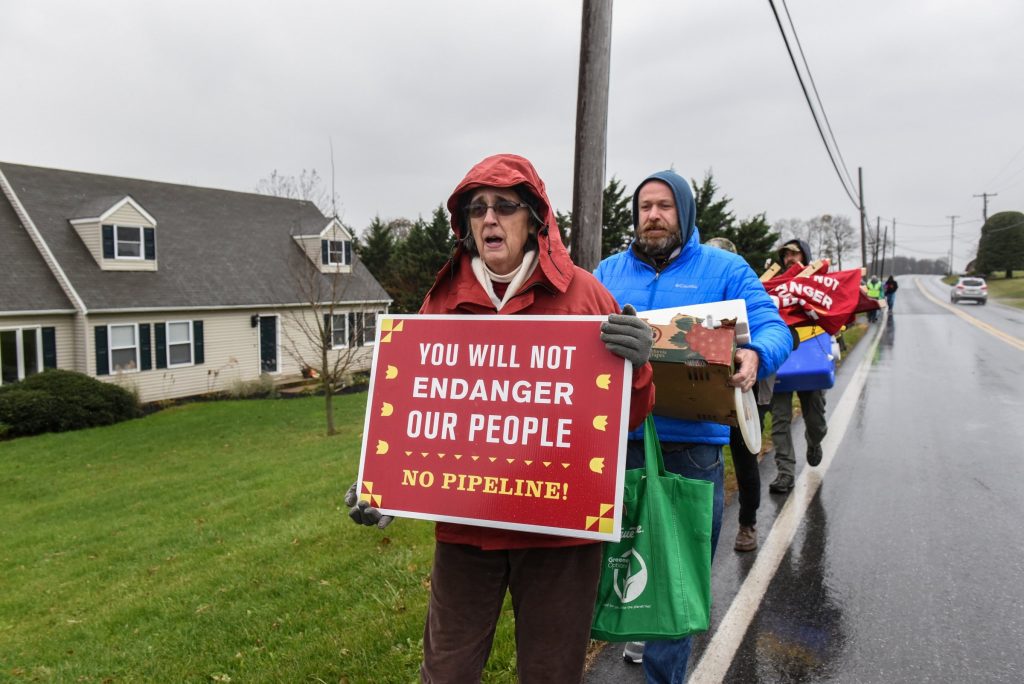The Adorers of the Blood of Christ have returned to court arguing that the existence of a 3-year-old natural gas pipeline through their land in Pennsylvania violates their religious freedom rights guaranteed under a 1993 law.
A lawsuit filed by the congregation of women religious in the U.S. District Court for the Eastern District of Pennsylvania is the latest step the order has taken to assert its rights under the Religious Freedom Restoration Act, known as RFRA.
This time, said Sister Janet McCann, a member of the order's St. Louis-based leadership team, the congregation is seeking a jury trial to present evidence about the practice of their faith and their belief Christians are called to protect creation from desecration.
"We've never had the chance to have our case heard, to be able to express how this violates our religious beliefs. That's what we're asking for, the chance to have a jury trial to have it decided whether or not the pipeline company is in violation of our religious beliefs," Sister McCann told Catholic News Service.
The lawsuit, filed last November, seeks unspecified monetary damages. Sister McCann said it is impossible to assess a monetary value for religious rights violations that will continue into perpetuity.
She explained that members of her order have long believed efforts must be taken to reduce dependence on fossil fuels and that the pipeline, like others, poses grave danger to the planet.
"More and more, we are learning how everything is connected, all of creation is connected," Sister McCann said. "When a violation is done to one part of creation, it hurts all of us."
The civil lawsuit names the Transcontinental Gas Pipe Line Co. of Harrisburg, Pennsylvania, known as Transco, as the defendant. It maintains that the company, a subsidiary of the Williams pipeline company, violated the order's religious beliefs when it used eminent domain to seize the congregation's property in Lancaster County, Pennsylvania, to construct a section of the Atlantic Sunrise pipeline.
The $3 billion, 183-mile pipeline delivers natural gas from the Marcellus shale geological formations in northeast Pennsylvania to distribution lines along the East Coast.
"We were stunned that eminent domain could be used for something that is not for the common good. It's just for this multibillion-dollar for-profit company," Sister McCann said.
Soon after the lawsuit was filed, Transco asked that it be dismissed. The parties presented arguments supporting their stances during a hearing on the motion before U.S. District Judge Jeffrey Schmehl. Attorney Dwight Yoder, who is representing the Adorers, said Schmehl offered no time frame for a decision on the dismissal motion.
Transco did not respond to an inquiry about the lawsuit.
Schmehl presided over the order's first federal lawsuit filed in 2017, which also raised RFRA claims about the pipeline's construction under property used as farmland adjacent to a nursing home the sisters operate in Columbia, Pennsylvania. Schmehl dismissed that lawsuit on procedural grounds and the ruling was upheld by a federal appeals court.
The U.S. Supreme Court in February 2019 declined to hear arguments in the case.
But the appeals court left open the door for the current lawsuit, Yoder said. The appeals court said the Adorers could initiate a claim for damages under RFRA provisions that intersect with provisions under the Natural Gas Act, which governs aspects of pipeline construction nationwide.
It took nearly two years for the order to discern their course. Yoder credited the sisters for adhering to their beliefs.
"They felt compelled to move this forward," he said. "There's not many folks in this world that will give up worldly possessions and follow religious beliefs in everything they do. This is a reflection of who they are, which is their lives are dedicated to their faith. For a pipeline company to come in and trample on their rights violates everything that they're all about."
Sister McCann told CNS the order has resisted overtures from Transco to build the pipeline since 2014 because it violated its land ethic, which holds that all land created by God is sacred and that the fossil fuel project would desecrate the landscape.
"We didn't go looking for this. It came to us," she said of the efforts to resist the pipeline.
When construction was set to begin in 2017, the Adorers allowed local people opposed to its construction to build a chapel on the sisters' land adjacent to the pipeline route. The chapel became a gathering place for people to pray and vigil throughout construction.

